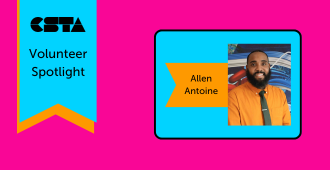Welcome to the CSTA Volunteer Spotlight series, where we celebrate the incredible individuals who dedicate their time and passion to making a difference in the CSTA community. Join us in recognizing and appreciating the extraordinary efforts of Allen in their role as Chapter Leader Committee Member.
What inspired you to volunteer your time with CSTA? How has this experience impacted you?
I believe in fully committing to any organization I join rather than just observing from the sidelines. Volunteering with CSTA has allowed me to actively voice my ideas and contribute to shaping an organization that holds a great deal of potential. This experience has enhanced my leadership skills and deepened my understanding of collaborating effectively with diverse teams toward shared goals, particularly in chapter leadership.
How long have you been involved with CSTA, and what motivated you to join?
I first became involved with CSTA in 2019 after attending a presentation about the organization during a training session I led with CodeVA in Virginia. I was initially surprised by my lack of familiarity with the group but was immediately impressed by what I learned. The motivation to join stemmed from my search for a community, which is often lacking in the CS education space. CSTA not only provided me with that sense of community but also offered much more!
Can you share any memorable experiences or highlights from your involvement with CSTA?
One of the most memorable experiences I’ve had with CSTA was during my 2022-23 Equity Fellowship, where I had the opportunity to collaborate with some of the brightest educators in the country. This fellowship profoundly impacted my understanding of equity—what it truly means and who is affected when decisions lack an equitable focus. The insights I gained continue to influence my daily work and approach to education.
How has CSTA impacted your teaching career and professional development?
CSTA has significantly validated and supported the concepts I believed were crucial for teaching computer science effectively. Coming from a mathematics background, I was familiar with the extensive literature on inquiry-based teaching methods and strategies for engaging underserved students. CSTA provided me with similar standards, training, and workshops for computer science, which enhanced my professional development offerings by providing research-backed strategies and documentation. This support has been instrumental in amplifying my work and impact with teachers.
In what ways do you see CSTA shaping the future of computer science education?
I believe CSTA is poised to define the standard for computer science education across the nation. With its network of brilliant educators from diverse policy environments in various states and countries, CSTA serves as a central hub for innovative ideas. This collaboration provides invaluable guidance and direction for educators navigating the field of computer science education.
Are there any specific initiatives or projects within CSTA that you’ve been particularly passionate about?
Besides the Equity Fellowship, I am deeply passionate about my involvement with the Chapter Leaders committee. We often emphasize that the strength of a CSTA chapter heavily depends on its leadership. Despite our varied obligations, it’s crucial to focus on our shared challenges and use these insights to help other chapters develop robust local networks and ecosystems. This commitment aims to create communities that teachers are eager to join and contribute to in their different parts of the world.
What does the future of CSTA look like?
I am optimistic about CSTA’s future; it can only grow from here! With a continued emphasis on welcoming new educators and ensuring equitable access for all students, CSTA is poised to become an essential resource for computer science teachers. In many respects, CSTA already embodies the heart of the CS education community.

